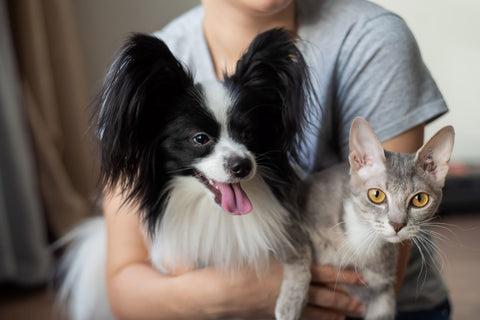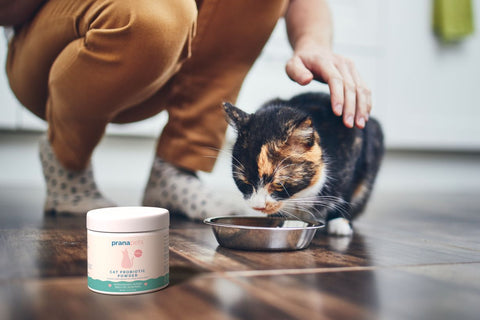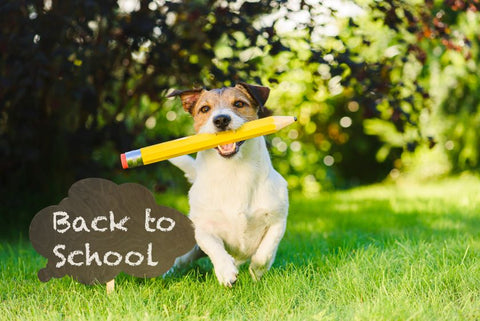

Creating Healthy Habits: Daily Routines for Pets
Every pet needs consistency and predictability. A daily wellness routine is a great way for dog owners to keep their furry family members healthy, happy, and calm. From morning to bedtime, adding helpful habits to your pet's day can improve their physical and mental health. Let’s look at a typical day for a well-cared-for pet and see how you can create a routine that works for you!
What are the benefits of establishing a daily routine for pets?
Having a daily routine for pets can help reduce their anxiety and improve their behavior. When pets have consistent times for feeding, exercise, and playtime, it makes them feel secure. It also helps them trust their owners better. A good routine can lead to a healthier lifestyle for pets.
Morning: Fuel and Fresh Air
Start your day well by having a steady morning routine. Just like us, pets also gain from a good start to their day.
- Breakfast time: Feed your pet a healthy meal each morning at the same time. For dogs, you can use protein-rich dry or wet food. For cats, give a mix of kibble and wet food. You can add Probiotic Powder to help with digestion from the start. - Tip: A scoop of probiotics or some Immunity Blend can help their immune system.
- Morning walk or play: - For dogs: Go for a 20-30 minute walk so they can stretch their legs and feel active. Morning walks keep them moving and help burn off any nervous energy before the day gets busy. - For cats: Have some fun playtime with a laser pointer or a feather toy for about 10 minutes. This wakes them up and gives them a bit of mental stimulation to start their day.
- Hydration check: Always keep fresh water available, especially after physical activity.
Feeding Schedule Importance and Tips
Setting a feeding schedule for your pet is very important for their health, according to a veterinarian. Having consistent meal times helps control their metabolism. It can stop them from eating too much and helps keep their weight healthy. Here are some tips to remember when you make a feeding schedule for your furry friend:
- Pick good and healthy food that fits your pet's age, size, and eating needs.
- Divide their daily food into two or three meals.
- This helps avoid stomach problems.
- It also keeps them happy and full during the day.
- Avoid letting your pets eat anytime they want.
- This helps you keep track of how much they eat.
- It can also help stop them from getting overweight.
After you set a feeding schedule for your pet, it is important to look after their health and happiness all day. Make sure they always have fresh water to drink. This is especially important after they do any physical activity.
articlebanners1
Midday: Mental Stimulation and Light Activity
As the day goes on, your pet will need both rest and activity. Midday routines can break up their day. This offers them mental and physical stimulation when you are busy or not home.
- Mental exercise: Use toys that challenge your pet's mind, like puzzle feeders or interactive toys.
- Dogs: A treat-dispensing toy can keep them busy while you work.
- Cats: A toy that moves, like a battery-operated mouse, can help bring out their hunting skills.
- Midday check-in: If you can, take 10-15 minutes to play with your pet. A quick game of fetch, tug-of-war, or some pats and cuddles can really help break up their day. It keeps them from feeling lonely.
- Snack time: Give them a healthy treat to hold them over until dinner. You could offer a dental chew, a small piece of fruit or vegetable, or a soft chew supplement that helps with their joints or skin.
Afternoon: Exercise and Engagement
By the afternoon, your pet will feel ready for more fun. This is a good time to spend some quality time together and get in some physical exercise.
- Afternoon walk: A 15-30 minute walk in the afternoon can help dogs release energy and get fresh air. This can also stop boredom and behavioral issues that happen from not enough activity. If you have a high-energy dog, think about making this walk longer or adding fun playtime, like playing fetch or running together.
- Indoor play for cats: Cats usually feel energetic in the late afternoon. It’s a good idea to use this time to play with them using toys that look like things they would hunt, like a wand toy or a catnip mouse. If your cat likes being outside, a few supervised minutes outdoors (or in a catio) can really make their day special.
Evening: Wind Down and Relax
As the evening ends, you should make a relaxing space for your pet. What you do now will show them that it’s time to relax.
- Dinner time: Serve your pet's evening meal at the same time every night. This helps with digestion and gives them a routine, just like breakfast.
- Supplement support: This is a good time to give supplements that work well at night, like calming aids such as CBD Oil or Nervous System Support. They can help your pet feel relaxed before bed. Melatonin for dogs is also a great option for dogs who need a little extra help with their sleep schedule.
- Wind-down activity: Spend some time cuddling, brushing, or playing gently with your pet to help them relax. A gentle massage works well for dogs to release tension. Cats usually like a warm lap or a cozy spot near you.
- Nighttime potty break: If you have a dog, make sure to take them out for a quick potty break before sleep. This can help avoid accidents and allows them to settle down for the night.
- Bedtime routine: Make a quiet and comfortable space for your pet to wind down. Whether it’s a dog bed, crate, or a cozy corner, having a special sleep spot helps them feel relaxed and signals it’s time to rest.
Consistency Is Key
The key to a successful pet wellness routine is to be consistent. Pets feel better when they know what will happen each day. By keeping regular feeding times, exercise, play, and rest, you can help lower their anxiety and boost their health.
Sample Daily Routine for Your Pet
Here is a simple daily routine example to help you begin:
- 7:00 AM – Time for breakfast and a morning walk for 20 to 30 minutes.
- 9:00 AM – A puzzle toy or a treat-dispensing toy for some mental stimulation.
- 12:00 PM – A light play session or a quick midday check-in.
- 1:00 PM – A healthy snack or chew time.
- 3:00 PM – Another walk or playtime for 15 to 30 minutes in the afternoon.
- 6:00 PM – Dinner time, with some supplements.
- 7:00 PM – A wind-down play session or cuddle time.
- 9:00 PM – A last potty break and the bedtime routine.
articlebanners2
Tips for Managing Routines with Busy Work Schedules
If you have a busy work schedule, think about adding interactive toys or puzzles for your pet. This can help keep them mentally active while you are away. These toys can stop boredom and reduce anxiety.
- Hiring a dog walker or pet sitter for midday visits can help your pet feel happier and give them the exercise and attention they need.
- Use tools like automatic feeders or cameras to keep an eye on your pet's routine, even when you are not at home.
- Talk with your pet sitter or dog walker about your pet's daily habits and likes to ensure they get the same care every time.
Integrating Social Interaction into Your Pet’s Routine
Integrating social activities into your pet's routine is very important for their wellbeing. Pets are social animals, and they gain from spending time with other animals and people. Think about setting up playdates with other pets, visiting a dog park, or signing them up for training classes. These activities offer good mental stimulation and chances for socialization.
By adding these elements to your pet's daily routine, along with regular feeding, exercise, and rest, you can help them be happy and healthy. A balanced routine that fits your pet's needs will build your bond and improve their life.
Adapting Routine for Pets with Special Needs
Pets that have special needs need more care and attention in their daily routines. It is important to adjust their routine to fit their specific needs. This may include things like taking medicine on time, helping with movement, or following special diets.
Having regular vet check-ups is important. Working with a professional trainer or behaviorist can help, too. This way, you can change your routine to meet your pet’s special needs better.
Consistency is important, but being flexible and patient is also very important. This is especially true when you are taking care of a pet that has special needs.
Age-Specific Routine Needs for Pets: Puppies, Kittens & Seniors
Pets of different ages need different routines to stay happy and healthy.
Puppies and kittens need to go to the bathroom often. They also need more meals and playtime to help them grow. As they grow into adults, it is important to have a regular schedule for feeding, exercise, and mental stimulation. This helps keep them healthy.
Senior pets might need some changes to their daily routines. This is to help with their movement, food needs, and health issues. It's important to give them a cozy home, take them to the vet regularly, and make sure they get gentle exercise suited to what they can do.
The Impact of Daily Routines for Pets on Mental Health
Having a daily routine for your pet is important for their wellbeing and mental health. A consistent schedule for feeding, exercise, playtime, and rest can help lower stress. It also gives your pet a sense of security. When pets know what to expect each day, they feel more relaxed.
You can use interactive toys and arrange midday check-ins to keep the routine in place, even if you have a busy job. Good communication with pet sitters or dog walkers is key to ensuring that your pet's daily routine allows for playtime to expend some excess energy and preferences are followed. Doing this can lead to a happy and healthy life for your furry friend.
Wrap-Up: Build a Routine That Works for You
Every pet is different. Your daily schedule might change based on your pet's energy, age, health needs, and sleeping habits, including their need for nap time. Begin by setting regular times for meals, walks, and playtime. Then, feel free to adjust these times as needed. A good routine helps your pet feel safe and secure. It also lowers their anxiety and makes sure they get the mental stimulation and physical activity they need every day.
Create a daily routine that suits you and your furry friend. A happy pet will lead to happier pet parents!
articlebanners3




